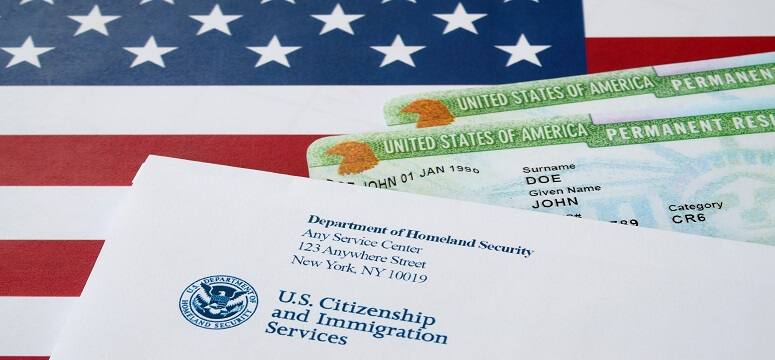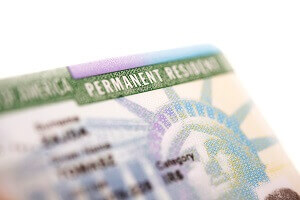Understand The Common Reasons Behind Green Card Denial
Green Card applications are crucial for individuals seeking permanent residency in the United States. The process can be complex and often requires a thorough understanding of immigration laws and regulations., A denied green card results from various reasons, including incomplete or incorrect information, health concerns, criminal records, security concerns, inadmissibility under INA 212(a), or failure to maintain nonimmigrant status.
This blog aims to provide valuable insights into the common reasons for a denied green card and the steps that you can take to avoid them. By familiarizing yourself with the process and the potential challenges, you can take proactive measures to increase your chances of obtaining a Green Card.
From the importance of seeking professional assistance to the role of
immigration lawyers and doctors, this blog will cover the various aspects of the Green Card application process and provide a comprehensive guide for applicants. Whether you are a first-time applicant or have faced rejection in the past, this blog will equip you with the knowledge and understanding necessary to navigate the Green Card application process successfully.

Incomplete Or Incorrect Information
Incomplete or incorrect information is one of the most common reasons why there is denied green card. Providing false or misleading information can have serious consequences, including being barred from entering the United States or deported. It is crucial to understand the importance of providing complete and accurate information to avoid denial of your Green Card application.
One of the most common examples of incomplete or incorrect information is a misrepresentation of facts. This can include providing false information about one’s employment, education, or marital status. Providing false information can have serious consequences, including being barred from entering the United States or deported.
Another example is the omission of relevant information. This can include failing to disclose previous arrests or prior immigration violations. Understanding that even minor omissions can result in a denied green card Card application is essential.
It is crucial to understand that providing complete and accurate information is essential to the success of the Green Card application. By thoroughly reviewing the information before submission and seeking professional assistance, you can reduce the risk of denial due to incomplete or incorrect information.
Health Concerns
Health concerns play a crucial role in the Green Card application process and can lead to a denied green card if not addressed appropriately. The U.S. government has established health-related grounds of inadmissibility to protect public health and safety. Individuals with communicable diseases and physical or mental disorders are generally considered inadmissible. It is because they may pose a threat to the safety or property of others, or drug abuse or addiction.
Communicable Diseases
Communicable diseases are one of the most common health-related grounds for inadmissibility. The U.S. government has established a list of infectious diseases that threaten public health, including tuberculosis, cholera, and yellow fever. If an individual has been diagnosed with one of these diseases, their Green Card application may be denied.
Physical or Mental Disorders
Physical or mental disorders that pose a threat to the safety or property of others can also result in a Green Card application denial. This can include individuals with a history of violent behavior or those diagnosed with a mental disorder that impairs their ability to function.
To overcome this ground of inadmissibility, individuals must demonstrate that they have been effectively treated and no longer pose a threat to public safety. Seeking professional medical assistance can help provide the necessary medical examinations and evaluations to support the Green Card application.
It is essential to understand that health concerns can significantly impact the Green Card application process. Aside from health concerns, the USCIS will scrutinize Green Card applicants for their criminal records. The next section will discuss how your Green Card can be denied due to criminal history.
Criminal Records
A criminal record can significantly affect the Green Card application process, with the U.S. government denying entry to individuals convicted of certain crimes. The type and severity of the crime and the individual’s rehabilitation and circumstances are considered when determining admissibility.
Types Of Criminal Offenses
Various types of criminal offenses can result in a denied green card, including but not limited to crimes of moral turpitude, drug offenses, and human trafficking. Crimes of moral turpitude are considered particularly heinous and can include theft, fraud, and murder. Drug offenses and human trafficking are also regarded as serious crimes and can result in Green Card denial.
Overcoming Criminal Inadmissibility
While having a criminal record can present significant challenges in the Green Card application process, it is possible to overcome criminal inadmissibility. This can include obtaining a waiver of inadmissibility or demonstrating rehabilitation and circumstances that support admissibility. Seeking professional legal assistance can help ensure that the necessary information and documentation are provided to support the Green Card application.
Having a criminal record can significantly impact your Green Card application. Moreover, the USCIS will also check Green Card applicants for ties with political organizations that can potentially threaten national security. The next section will discuss how Green Cards are denied based on security concerns.
Security Concerns
Security concerns are a significant factor in the Green Card application process, with the U.S. government taking a strict stance on individuals who threaten national security. This can include individuals with ties to terrorist organizations, those who have committed human rights abuses, and those who engage in espionage or sabotage.
Ties To Terrorist Organizations
Having ties to terrorist organizations is one of the most significant security-related grounds for inadmissibility. The U.S. government takes a strict stance on individuals associated with groups engaging in terror and violence. If an individual is found to have such ties, their Green Card application may be denied.
Human Rights Abuses
Individuals who have committed human rights abuses, including but not limited to torture, genocide, and extrajudicial killing, are generally considered inadmissible. The U.S. government takes a firm stance on individuals who have engaged in such acts and may deny their Green Card application.
It is essential to understand that security concerns can significantly impact the Green Card application process. By familiarizing yourself with the security-related requirements and seeking professional assistance, you can increase your chances of obtaining a Green Card.
Failure To Maintain Nonimmigrant Status
 Failing to maintain nonimmigrant status is another common reason for Green Card denial. Nonimmigrant status refers to a temporary immigration status, such as a visitor visa or student visa, which allows an individual to enter the U.S. for a specific purpose. Maintaining nonimmigrant status requires compliance with certain conditions, such as maintaining a valid visa, not engaging in unauthorized employment, and not overstaying the designated length of stay.
Failing to maintain nonimmigrant status is another common reason for Green Card denial. Nonimmigrant status refers to a temporary immigration status, such as a visitor visa or student visa, which allows an individual to enter the U.S. for a specific purpose. Maintaining nonimmigrant status requires compliance with certain conditions, such as maintaining a valid visa, not engaging in unauthorized employment, and not overstaying the designated length of stay.
Overstaying
Overstaying the length of stay is one of the most common reasons for failure to maintain nonimmigrant status. This occurs when an individual remains in the U.S. beyond the end date specified on their visa or I-94 form. Overstaying the length of stay can result in various consequences, including barred reentry to the U.S. and ineligibility for certain immigration benefits. Examples of overstaying the length of a visit include the following.
- Tourists who remain in the U.S. after their visitor visas have expired.
- Students who continue to study in the U.S. after their student visas have expired.
- Business travelers who engage in unauthorized employment or otherwise extend their stay beyond the original purpose of their visit.
Individuals who overstay their length of stay can face severe consequences, including barred reentry to the U.S. and ineligibility for certain immigration benefits. For example, an individual who overstays their length of stay by more than 180 days but less than one year may be barred from reentering the U.S. for three years. An individual who overstays their length of stay by more than one year may be barred from reentering the U.S. for ten years.
To avoid overstaying the length of stay, individuals need to understand the conditions of their nonimmigrant status and take proactive steps to maintain compliance. This can include, for example, renewing visas and I-94 forms promptly, avoiding unauthorized employment, and departing the U.S. before the end date of their length of stay.
Engaging In Unauthorized Employment
Another common reason for failure to maintain nonimmigrant status is engaging in unauthorized employment. This occurs when an individual works in the U.S. without obtaining the proper authorization or works in a capacity that is inconsistent with their nonimmigrant status. Engaging in unauthorized employment can result in the revocation of one’s visa, barred reentry to the U.S., and ineligibility for certain immigration benefits.
Violating Other Conditions Of Nonimmigrant Status
 In addition to overstaying the length of stay and engaging in unauthorized employment, individuals can also fail to maintain nonimmigrant status by violating other conditions of their status. This can include, for example, engaging in unauthorized study or traveling outside the U.S. without obtaining an advance parole.
In addition to overstaying the length of stay and engaging in unauthorized employment, individuals can also fail to maintain nonimmigrant status by violating other conditions of their status. This can include, for example, engaging in unauthorized study or traveling outside the U.S. without obtaining an advance parole.
Failing to maintain nonimmigrant status can seriously affect an individual’s immigration status. By staying informed about the conditions of one’s nonimmigrant status and taking proactive steps to maintain compliance, individuals can avoid the potential pitfalls of failure to maintain nonimmigrant status and increase their chances of obtaining a Green Card.
Lincoln-Goldfinch Law – Abogados de Inmigración
Seeking assistance from an immigration attorney can be vital for seeking a green card. An experienced immigration attorney can help you understand the requirements for a green card, ensure that your application is complete and accurate, and represent you in case of a denial or other complications.
For example, a Lincoln-Goldfinch Law – Abogados de Inmigración immigration attorney can guide the application process, including what information and documentation are required, how to respond to requests for additional information, and how to address any potential inadmissibility issues. They can also provide representation in the event of a denial or other complications, including filing appeals and motions to reopen cases.
In addition to providing guidance and representation, a Lincoln-Goldfinch Law – Abogados de Inmigración immigration attorney can also help you understand the legal basis for a green card and the impact of any prior immigration history. They can also help you navigate the complex immigration laws and regulations and help you prepare for interviews and other requirements of the application process. With the proper guidance and representation, you can increase your chances of obtaining a green card and realizing your dream of living and working in the U.S.
Contact A U.S. Immigration Attorney Today!
Categories
How To Find Us
What Our Clients Say
“This Lawfirm is great, very professional and helpful. I love that they are always in communication and always available for when you have questions . 100% recommended by me and my family. Thank you Lincoln-Goldfinch Law – Abogados de Inmigración”





